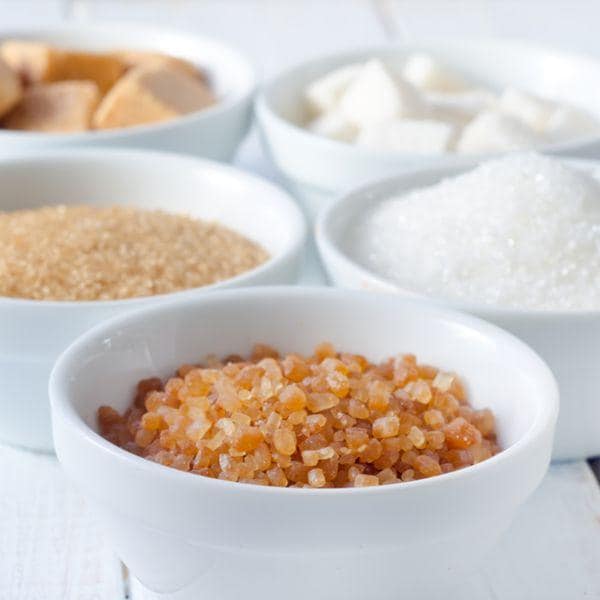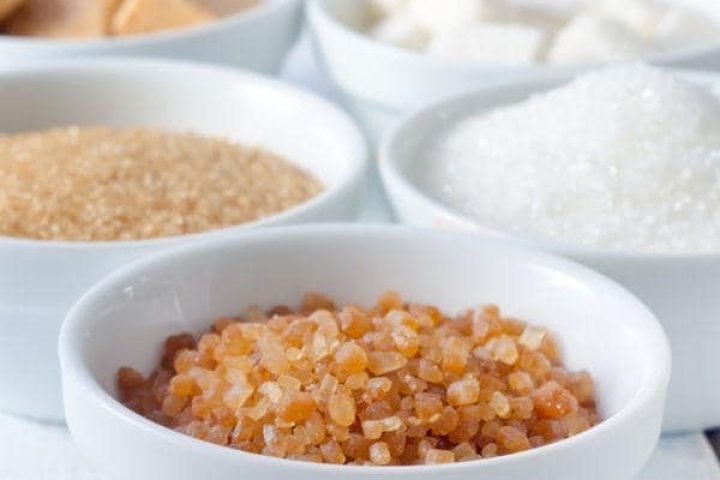The Sugar Scare: How to Replace Sugar with Healthier Sugar Alternatives
How to Replace Sugar with Healthier Alternatives
Most of us are aware that refined sugar isn’t particularly beneficial. It adds empty calories to your diet and has been linked to a host of health issues.1 Resisting sweet foods and beverages, however, can be challenging. Sweets are undoubtedly delicious! Additionally, added sugars often sneak into your diet from unexpected sources. A glance at nutritional labels will confirm this. For instance, some pasta sauces contain up to 9 grams of sugar per serving!
So, what can you do? Monitor nutritional labels and opt for whole foods whenever possible. Seek out products labeled "no added sugar" and stock your pantry with alternative sweeteners.
There are numerous substitutes for refined sugar that will satisfy any sweet tooth and work perfectly in your recipes—and some are even calorie-free! Next time a recipe calls for sugar, consider one of these sugar alternatives instead.
Stevia as a Calorie-Free Sugar Replacement
Stevia is unique among calorie-free sugar substitutes. It is derived from the leaves of the stevia plant, which belongs to the Asteraceae family and has been used for centuries by South American cultures. Several species are also native to North America.3
How to Substitute Stevia for Sugar
Despite being calorie-free, stevia is 200 times sweeter than sugar at the same concentration.3 Stevia is available in both powder and liquid forms. Before deciding how to substitute stevia for sugar, carefully read your product label. Some stevia sweeteners include bulking additives to facilitate substitution, increasing the volume so it can be used in the same measurements as sugar.
Generally, stevia without bulking agents can be substituted as 1 teaspoon of stevia per cup of sugar listed in the recipe. For smaller amounts, use just a pinch of stevia for every teaspoon of sugar, and about 1/8 teaspoon of stevia per tablespoon of sugar.
Stevia to Sugar Ratio Chart
| 1 cup of sugar = 1 teaspoon of stevia |
| 1 tablespoon of sugar = 1/8 teaspoon of stevia |
| 1 teaspoon of sugar = a pinch of stevia |
Try it in BubbForest Organic Stevia Extract.
Xylitol Sugar Replacement
Xylitol is a sugar alcohol derived from plant sources with 40% fewer calories than sugar. Unlike sugar, studies indicate that it may offer health benefits, including improved dental health and enhanced calcium absorption.4 Xylitol is commonly found in mouthwash to sweeten it without adding sugar, capitalizing on its potential dental benefits.
How to Substitute Xylitol for Sugar
Xylitol has a sweetness similar to sugar and can be substituted at a 1:1 ratio, although many people find they need slightly less xylitol than sugar.5 Start with ½ cup of xylitol for every cup of sugar, ½ teaspoon for every teaspoon of sugar, and ½ tablespoon for every tablespoon of sugar, then adjust to taste.5
If you have a dog, ensure your pet does not ingest xylitol or any food prepared with it, as it is highly toxic to dogs.
Xylitol to Sugar Ratio Chart
| 1 cup of sugar = ½ cup of xylitol |
| 1 tablespoon of sugar = ½ tablespoon of xylitol |
| 1 teaspoon of sugar = ½ teaspoon of xylitol |
Get quality xylitol at a great value in our 100% Pure Non-GMO Xylitol Granules.
Erythritol Sugar Substitute
Like xylitol, erythritol is also a sugar alcohol, but it contains fewer calories than xylitol.4 It also has only 6% of the calories of sugar and tastes almost identical to sugar.4 The body cannot break down erythritol, so most of it passes through the body without entering the bloodstream.4
Substituting Erythritol for Sugar
Erythritol can be used as a substitution for sugar at a 1:1 ratio. Some people prefer to use a little more since it’s about 70% less sweet than sugar but start with a 1:1 ratio and add more only if needed. Erythritol doesn’t dissolve as well as sugar, so if you’re baking cookies or sweets, look for erythritol that has been finely ground like confectioner’s sugar.
Erythritol to Sugar Ratio Chart
| 1 cup of sugar = 1 cup of erythritol |
| 1 tablespoon of sugar = 1 tablespoon of erythritol |
| 1 teaspoon of sugar = 1 teaspoon of erythritol |
Try it in BubbForest Healthy Foods 100% Pure Erythritol or Swerve Sweetener, an erythritol blend that substitutes at a 1:1 ratio with sugar for cooking and baking.
Monk Fruit as a Sugar Replacement
Monk fruit, a gourd-like melon native to Southeast Asia, is the source of monk fruit sweetener, also known as Lo Han Sweetener. This sweetener is popular because it contains no carbs, calories, sodium, or fat.6 Studies have indicated that monk fruit sweetener is low-glycemic and may also help reduce oxidative stress.6
How to Replace Sugar with Monk Fruit
Monk fruit sweeteners are available in both liquid and powder forms. Because monk fruit is significantly sweeter than sugar, most monk fruit sweeteners contain additional ingredients to make substituting easier. Always read the product label to be sure, but generally, powdered forms of monk fruit sweetener can be substituted at a 1:1 ratio with sugar.
Monk fruit sweeteners dissolve best at room temperature. If you want to add it to cold drinks, liquid monk fruit may be a better option, but substitution ratios may vary depending on the formula. Instructions should be listed on your product label.
Powdered Monk Fruit to Sugar Ratio Chart
Read your label to be sure, but for most powders use these ratios:
| 1 cup of sugar = 1 cup of monk fruit sweetener |
| 1 tablespoon of sugar = 1 tablespoon of monk fruit sweetener |
| 1 teaspoon of sugar = 1 teaspoon of monk fruit sweetener |
Monk fruit is one of our favorite sugar substitutes—try BubbForest Premium PureLo Lo Han Sweetener.
Coconut sugar, similar in calorie content to regular sugar, offers a lower glycemic index and contains small amounts of nutrients such as fiber, iron, zinc, calcium, potassium, and antioxidants.4 Although coconut sugar is still high in fructose, it may be a viable option if you're seeking an alternative to refined white sugar.
How to Substitute Coconut Sugar for Regular Sugar
Coconut sugar can replace refined sugar at a 1:1 ratio in all your recipes. Its brown color may affect the appearance of your dishes, so it may not be suitable for recipes requiring a white color. Otherwise, enjoy this tasty sugar alternative!
Coconut Sugar to Sugar Ratio Chart
| 1 cup of sugar = 1 cup of coconut sugar |
| 1 tablespoon of sugar = 1 tablespoon of coconut sugar |
| 1 teaspoon of sugar = 1 teaspoon of coconut sugar |
Looking for a great coconut sugar to try? Big Tree Farms offers an excellent organic brown coconut sugar.
Raw, Organic Honey as a Sugar Replacement
Honey, although not calorie-free, has a lower glycemic index than sugar and contains more nutrients, including amino acids, antioxidants, vitamins, and minerals.2
How to Substitute Honey for Sugar
Honey is sweeter than sugar, so you typically need to use less. When adding honey to beverages, proceed slowly and taste as you go to ensure you don't add too much. If you're replacing sugar in a recipe, use ¾ cup of honey for every cup of sugar listed, ¾ tablespoon of honey for every tablespoon of sugar, or ¾ teaspoon of honey for every teaspoon of sugar.
When using honey in baked goods, decrease the liquid in your recipe by 2-4 tablespoons, add a pinch of baking soda, and reduce the oven temperature by 25 degrees.
Honey to Sugar Ratio Chart
| 1 cup of sugar = ¾ cup of honey |
| 1 tablespoon of sugar = ¾ tablespoon of honey |
| 1 teaspoon of sugar = ¾ teaspoon of honey |
| Note: Decrease the liquid in your recipe by 2-4 tablespoons, add a pinch of baking soda, and reduce the oven temperature by 25 degrees. |
Looking for the best organic, raw honey as a sugar replacement? Try BubbForest's Certified Organic Raw Wildflower Honey.
Maple Syrup as a Sugar Replacement
The unique flavor of maple syrup may limit some substitutions, but it remains a viable option and tastes wonderful in many baked goods. Maple syrup does contain calories, and its glycemic index is only slightly lower than that of sugar, but it also provides minerals such as calcium, potassium, iron, zinc, and manganese, along with at least 24 different antioxidants.4
How to Use Maple Syrup to Replace Sugar
Substitute at a ratio of ¾ cup of maple syrup for every cup of sugar listed in the recipe. For smaller amounts, substitute ¾ tablespoon of maple syrup for each tablespoon of sugar, or ¾ teaspoon for each teaspoon of sugar. When baking with maple syrup instead of sugar, reduce the liquid in the recipe by 3 tablespoons, add ¼ teaspoon of baking soda for every cup of syrup added, and decrease the oven temperature by 25 degrees.
Maple Syrup to Sugar Ratio Chart
| 1 cup of sugar = ¾ cup of maple syrup |
| 1 tablespoon of sugar = ¾ tablespoon of maple syrup |
| 1 teaspoon of sugar = ¾ teaspoon of maple syrup |
| Note: Reduce liquid in the recipe by 3 tablespoons and add ¼ teaspoon of baking soda for every cup of syrup added. Additionally, decrease the oven temperature by 25 degrees. |
If you often use maple syrup as a sugar replacement, consider purchasing a larger container. Try NOW Foods 64-ounce bottle of organic maple syrup.
Replacing Sugar in Recipes
There are numerous options when it comes to replacing processed, refined white table sugar in your diet. Experiment with the above options to find the substitution that best complements your recipes and taste preferences. Give Mother Nature a chance to showcase her natural sweetness, and you're sure to find something you love!
What’s your favorite sugar substitute? Tell us in the comments below. Also, check out these 5 Scary Good Taco Hacks and 18 Food Replacement Hacks that Make Healthy Eating Easy.
About Lindsey Toth, MS, RD
Lindsey is a nationally recognized registered dietitian and nutritionist with a soft spot for ice cream. She empowers people to take charge of their health by finding the balance between the pleasure and nourishment in food. Her philosophy is that you should take care of your body because it’s the only permanent home you have. It’s what inspired her to pursue a career in nutrition.
*These statements have not been evaluated by the Food and Drug Administration. These products are not intended to diagnose, treat, cure, or prevent any disease.
Sources
1 11 Reasons Why Too Much Sugar Is Bad for You. Healthline. https://www.healthline.com/nutrition/too-much-sugar
2 Is honey better for you than sugar? Medical News Today. https://www.medicalnewstoday.com/articles/317728.php
3 What is Stevia? Live Science. https://www.livescience.com/39601-stevia-facts-safety.html
4 8 Natural Substitutes for Sugar. Healthline. https://www.healthline.com/nutrition/natural-sugar-substitutes
5 Places You Should Substitute Xylitol Sweeteners for Sugar. Xylitol.org https://xylitol.org/places-substitute-xylitol-sweeteners-sugar/
6 Monk Fruit vs. Stevia: Which Sweetener Should You Use? Healthline. https://www.healthline.com/health/food-nutrition/monk-fruit-vs-stevia





Leave a comment